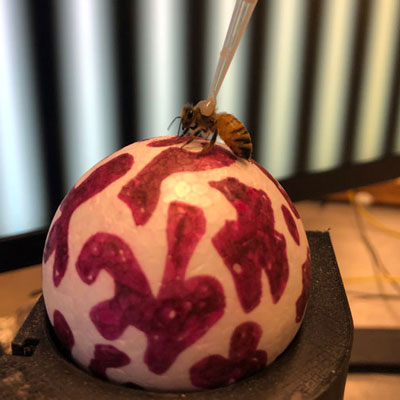New Study of Insecticides' Impact on Bees Keeps MBL Buzzing

Every week, Rachel Parkinson rides her bike to MBL with her research bees, which are housed at Falmouth Academy, secured safely in her backpack. Bee colonies in the U.S. and elsewhere have been in trouble over the last decade, with some beekeepers reporting losses of 30-90 percent of their hives, according to the U.S. Environmental Protection Agency. Bees are important pollinators for crops and natural ecosystems, so these unusually high declines are of concern to many, including scientists. While many scientists are studying the reasons for the bees’ decline, including the impacts of crop insecticides, Parkinson is introducing a new angle.
 Equipped with miniature harnesses that prevents them from flying away, bees are placed onto a suspended ball and presented with digital screens to replicate how a bee perceives movement. When they move the ball in the direction of movement, their responses are calculated. Photo: Rachel Parkinson
Equipped with miniature harnesses that prevents them from flying away, bees are placed onto a suspended ball and presented with digital screens to replicate how a bee perceives movement. When they move the ball in the direction of movement, their responses are calculated. Photo: Rachel Parkinson"Some studies have pointed to effects of insecticides on learning and memory in bees, but nobody has really looked to see if there are effects on sensory processing” says Parkinson, a Grass Fellow at MBL from the University of Saskatchewan.
Over the past nine weeks, Parkinson has been looking at how the most common agricultural insecticides, called neonicotinoids, interfere with a sensory processing system in bees called the optomoter response. The optomotor response is an innate behavior that is similar to how a human being turns its gaze toward movement. While humans accomplish this by moving their eyes to track the movement, insects will turn their entire body and walk in that direction. Bees use this innate behavior for flight and navigational purposes so any deficits could have dire consequences when bees try to find their way back to the hive.
Parkinson is not only testing this behavior, but is also seeing how certain neurons are affected by the insecticides. She is focusing on the descending neurons that connect the brain to the motor neurons in the rest of the body.
To test this, she is comparing the responses of healthy bees, feeding on pure sugar water, to those of bees that are given small amounts of insecticides like neonicotinoids.
"What I am expecting to see, once I'm done analyzing the data, is that the responses of these descending neurons are much lower when the bee is exposed to a neonicotinoid,” says Parkinson. “This will correspond with any deficits that I see in the behavior."
It is not just the neonicotinoids that might be causing the problem. As neonicotinoids become known for their role in diminishing bee populations, they are losing favor with the public. However, a newly developed insecticide that has just been approved for use in the U.S., called sulfoxaflor, might not be any better for the bees. To find out, Parkinson is testing some of her bees with small doses of this pesticide, too. In a different study Parkinson is conducting, sulfoxaflor seems to be less toxic to locusts than neonicotinoids have been. However, bees wouldn’t necessarily respond the same way.
"Bees have really limited numbers of detoxification enzymes, so their detoxification systems and their immune systems are quite weak compared to other insects,” says Parkinson, who notes that even in small doses, insecticides can have lasting effects on these beneficial insects.
 Rachel Parkinson. Photo: the Grass Foundation
Rachel Parkinson. Photo: the Grass FoundationCommitted to the cause of protecting bee populations, Parkinson wants to “bring awareness to the fact that sub-lethal doses of insecticides can have major effects,” she says. She notes that while the late science writer Rachel Carson, who was once a researcher at MBL herself, began making the case for limiting the amount of toxins in the environment, that message remains relevant. Parkinson hopes that comparative toxicology research like this could pave the way for bees and agriculture to have a more harmonious existence.
“By developing experiments where we can effectively test and compare different insecticides, we could hopefully find some options that are less toxic for bees," she says.
After the conclusion of her Grass Fellowship at MBL, Parkinson will defend her PhD before heading to the University of Oxford to begin her postdoctoral research, testing whether different species of bees can taste pesticides. Being able to detect pesticides like this could help bees avoid them, which could provide breakthrough data in the fight to preserve these crucial pollinators.